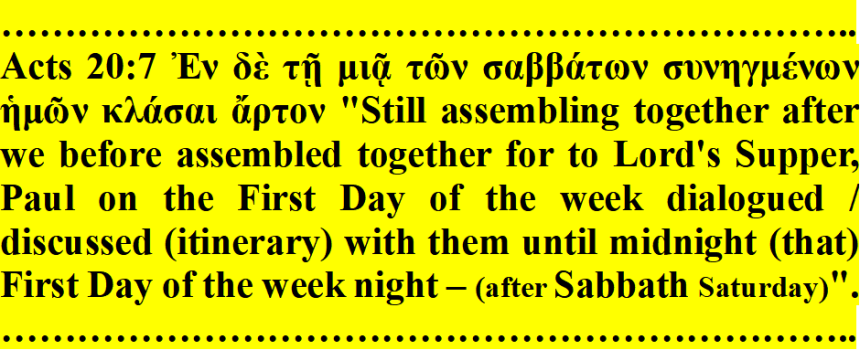In the New Covenant we see the Law of Christ is the standard, which is a higher standard than the Law of Moses.
When God was about to speak the law to Israel, of what did He tell Moses to remind them?
"Tell the children of Israel; Ye have seen what I did unto the Egyptians, and how I bare you on eagles' wings, and brought you unto Myself." Ex. 19: 3, 4.
What covenant did He propose to make with them?
"Now therefore, if ye will obey My voice indeed, and keep My covenant, then ye shall be a peculiar treasure unto Me above all people: for all the earth is Mine: and ye shall be unto Me a kingdom of priests, and a holy nation. These are the words which thou shalt speak unto the children of Israel." Ex. 19:5, 6.
What is a covenant?
"A mutual agreement of two or more persons or parties, in writing and under seal, to do or to refrain from some act or thing; a contract." Webster.
When Moses told the people what the Lord had proposed, what did they say?
"And all the people answered together, and said, all that the Lord hath spoken we will do. And Moses returned the words of the people unto the Lord." Ex. 19:7, 8.
In the Covenant which the Lord proposed to make with Israel, what did He say that they were to do?
"Now therefore, if ye will obey My voice indeed, and keep My covenant." Ex. 19:5, first part.
What was His covenant which they were to keep as their part of the mutual agreement or covenant between Him and them?"
"And he declared unto you His covenant, which He commanded you to perform, even ten commandments; and He wrote them upon two tables of stone." Deut. 4:12, 13.
What relation did the ten commandments bear to the covenant made between God and the children of Israel?
As seen by the last text quoted, the ten commandments were the "covenant" to which the Lord referred, when in proposing a covenant with Israel, He said, "Now therefore, if ye will obey my voice indeed, and keep my covenant, then ye shall be a peculiar treasure unto me above all people: for all the earth is mine:" Ex. 19:5.
NOTE. - The ten commandments were termed God's covenant before the covenant was made with Israel. They were not an agreement made, but something which God commanded them to perform, and He promised them something, provided they would keep them. Thus the ten commandments, God's covenant, became the basis of the covenant made between Him and Israel. The ten commandments, in all their details, are "all these words," concerning which the covenant was made. See Ex. 24:8.
After God had spoken His law (the "covenant which He commanded," Ex. 20:3-17), did He continue speaking to the people?
"And He added no more. And He wrote them in two tables of stone, and delivered them unto me." Deut. 5:22.
What was the nature of the instruction afterward given to Moses (Ex. 20:22, 23)?
It was a practical application or explanation of the ten commandments, so that the people might be able better to understand what was involved in the keeping of them. The reference to the altar, how it should be built, and how approached, in Ex. 20:24-26, simply shows the care that God would have taken in His worship. In Ex. 23:14-19 we have other commandments also concerning worship.
As reported in Ex. 24:3, Moses told the people all the words of the Lord, and they promised to be obedient. What did Moses then do, that there might be no misunderstanding?
"And Moses wrote all the words of the Lord, and rose up early in the morning, and builded an altar under the hill, and twelve pillars, according to the twelve tribes of Israel... And he took the book of the covenant, and read in the audience of the people." Ex. 24:4, 7.
When the people had again heard the words of the Lord, and again promised obedience (verse 7), what was done to ratify the covenant which had thus been made?
"And Moses took the blood, and sprinkled it on the people, and said, Behold the blood of the covenant, which the Lord hath made with you concerning all these words." Ex. 24:8. "And sprinkled both the book and all the people, Saying, This is the blood of the testament which God hath enjoined unto you." Heb. 9:19, 20.
NOTE. - We have here the complete account of the making of the first covenant. It consisted of a promise of obedience to the ten commandments, on the part of the children of Israel, and the statement by the Lord of what He would do for them provided they obeyed His voice.
Is the covenant made at Sinai the only covenant which God made with Israel?
"Behold, the days come, saith the Lord, that I will make a new covenant with the house of Israel, and with the house of Judah: not according to the covenant that I made with their fathers, in the day that I took them by the hand to bring them out of the land of Egypt; which My covenant they brake, although I was a husband unto them, saith the Lord." Jer. 31:31, 32.
What comparison does God make between the two covenants?
"But now hath He obtained a more excellent ministry, by how much also He is the mediator of a better covenant, which was established upon better promises. For if that first covenant had been faultless, then should no place have been sought for the second." Heb. 8:6, 7.
In what respect was the first covenant faulty?
It must have been faulty in the very particulars wherein the second was better, namely, in the promises, as seen by the last part of verse 6: "He [Christ] is the mediator of a better covenant, which was established upon better promises."
What are the promises of the new covenant?
"For this is the covenant that I will make with the house of Israel after those days, saith the Lord; I will put My laws into their mind, and write them in their hearts; and I will be to them a God, and they shall be to Me a people: and they shall not teach every man his neighbor, and every man his brother, saying, Know the Lord: for all shall know Me, from the least to the greatest." Heb. 8:10-11. "For I will forgive their iniquity, and I will remember their sin no more." Jer. 31:34, last part.
Are these promises stated in the order of their fulfillment?
It is evident that in Jer. 31:33, 34, where the promises of the new covenant are more fully stated than in Heb. 8:10, 11, those promises are not stated in the regular order of their fulfillment; because forgiveness of sins is mentioned last, whereas it must necessarily precede the writing of the law in the heart; remembering sin no more, or blotting out of sin; and translating the people to the heavenly Jerusalem, where all shall see and know the Lord. See Isa. 54:11-13; Rev. 21:2-4.
In the first covenant, to what was Israel's promise really equivalent?
In the first covenant the people promised to keep all the commandments of God, so as to be worthy of a place in His kingdom. This was a virtual promise to make themselves righteous; for God did not promise to help them. But says Christ, "Without Me ye can do nothing." John 15:5. And the prophet says, "All our righteousnesses are as filthy rags." Isa. 64:6. The only perfect righteousness is God's righteousness, and that can be obtained only through faith in Christ. See Rom. 3:20-26. The only righteousness that will insure us an entrance into the kingdom of God, is "the righteousness which is of God by faith." Phil. 3:9. Of those who shall inherit the kingdom of God, the Lord says, "Their righteousness is of Me" (Isa. 54:17); and the prophet says of Christ, when He has taken His place as king over all the true Israel, "This is His name whereby He shall be called, the Lord our Righteousness." Jer. 23:6.
To be continued...




